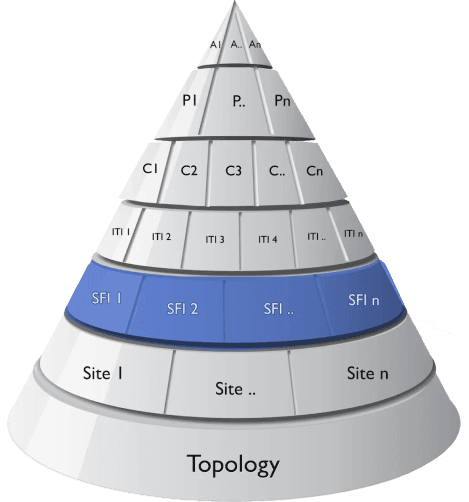Audit & Assessment
Holistic Digital Infrastructure Certification
Audit & Certifications
The International Data Center Authority (IDCA) serves as the premier standardization, and certification body for the Application Ecosystem® and its supporting digital infrastructure. IDCA delivers comprehensive, effective, up-to-date, and uniquely innovative compliance audits and assessments. These audits encompass mission-critical applications, information technology (IT), cloud services, data centers, and all essential application-ecosystem supporting operations, documentation, policies, systems, components, and infrastructures.
Our Key Points
Holistic application, IT, cloud and data center audits and certifications are conducted on existing as well as new digital infrastructure.
All audits and certification modules follow the IDCA’s Application Ecosystem (AE) and Infinity Paradigm® standards framework.
The 5 Grade-Levels (G4®-G0®) risk-assessment process ensures specific design, build, and operations criteria are met.
All audits are inclusive of the 7 Efficacies of Availability, Capacity, Resilience, Innovation, Efficiency, Operations, Safety & Security.
Audits can apply to Application, Platform, Compute, IT Infrastructure (ITI), Site Facility Infrastructure (SFI), Site, and Topology.
Get in touch
“Application-centric, cutting-edge, IT and facility encompassing, infrastructure and operation enabling, educating, assuring, modern, and effective.”
IDCA has taken the collective strength of its predecessors as a baseline, compiled a comprehensive, unified, practical, and effective set of requirements that possess no vague areas, no contradictions, and no room for undermining the interests of the information technology, application, cloud, and data center community.
All ecosystems will be audited, either as designed, as-built, or as-operated on the basis of IDCA requirements to assess their compliance to IDCA Grade Levels®, and the seven (7) efficacies of availability, efficiency, capacity, operation, innovation, resilience, safety & security per each of the seven (7) application ecosystem layers of Application, Platform, Compute, IT Infrastructure (ITI), Site Facility Infrastructure (SFI), Site, and Topology.
-min.71895136.png&w=3840&q=75)
Grading System
IDCA provides a robust and all-inclusive grade system where applicable components under review are assessed against the seven (7) efficacies of Availability, Capacity, Resilience, Innovation, Efficiency, Operations, and Safety & Security. Each is scored individually through the Efficacy Score Rating (ESR®) and collectively represented in a G-Level grading system. This framework applies to applications, IT, cloud, and data center audits and certifications. The combination of individual efficacy scores at a particular layer, such as Compute, IT Infrastructure (ITI), or Site Facility Infrastructure (SFI), will render a Grade Level from G4® through G1®. G4® is the minimum compliance required by IDCA at every Application Ecosystem® layer, while G1® is the maximum achievable certification level for a single data center or component. Grade Level 0 (G0®) is reserved exclusively for a topology of data centers, representing the ultimate achievement across an interconnected ecosystem.

Grade Level 0
Grade Level 0 (G0®) is the ultimate level of achievement but can only be attained at the Topology layer across a network of data centers. It signifies the absolute minimum levels of risk, insecurities, inefficiencies, vulnerabilities, and chances of failure across the interconnected ecosystem. For individual layers such as a single Data Center Node (DCN), the highest attainable rating remains Grade Level 1 (G1®).

Grade Level 1
Grade Level 1 (G1®) is an exceptional level of achievement when awarded to any application, platform, compute, ITI, SFI, Site, or Topology layers. It represents the lowest levels of risk, insecurities, inefficiencies, vulnerabilities, and chances of failure that can be achieved within a single data center. G1® is therefore the highest attainable Grade Level for an individual Data Center Node.

Grade Level 2
Grade Level 2 (G2®) is an excellent level of achievement when awarded to any application, platform, compute, ITI, SFI, Site or Topology layers. G2 represents a low exposure to risks, insecurities, inefficiencies, vulnerabilities, and chances of failure.

Grade Level 3
Grade Level 3 (G3®) is the average level of achievement when awarded to any application, platform, compute, ITI, SFI, Site or Topology layers. G3 represents an average exposure to risks, insecurities, inefficiencies, vulnerabilities, and chances of failure.

Grade Level 4
Grade Level 4 (G4®) is the lowest level of achievement when awarded to any application, platform, compute, ITI, SFI, Site, or Topology layers. G4 represents the highest levels of risk, the highest acceptable level of insecurities, inefficiencies, vulnerabilities, and chances of failure.
The Infinity Paradigm® standards framework requires that the minimum acceptable compliance to be G4 and highest G0. The application, as the ultimate end-user of data, requires an ecosystem to perform and deliver its promise.
Audit Milestones
Application Ecosystem and Digital Infrastructure Design, Build and Operation Evaluations
Design Audit
Designing a data center requires significant planning. Businesses must establish the locations of servers, prime and contingency power sources, network routes, cooling equipment, cable management, and required safety measures. This process is an undertaking that most businesses cannot reliably perform in-house, creating worrisome financial risks for investors should any design mistakes slip past.
This process is an undertaking that most businesses cannot reliably perform in-house, creating worrisome financial risks for investors should any design mistakes slip past.
Design
Build
Operations
Download Audit & Assessment Brochure
Certification Scope
There are seven stack layers within the Application Ecosystem (AE) through which a given application is delivered, and a set of business functions are performed. However, not every organization owns the physical infrastructure or maintains the logical layers. IDCA audit and certification scope can vary based on the actual layers selected by the end-user to undergo evaluation, assessment and compliance checks. The seven layers are: Application, Platform, Compute, IT Infrastructure (ITI), Site Facility Infrastructure (SFI), Site, and Topology.
The 7 Stack Layers
The Site Facility Infrastructure (SFI) Layer contains the following components that may undergo risk and compliance review during an IDCA audit and certification process:
Electrical
- Electrical Architecture
- SLDs
- Electrical Distribution
- DBs
- Electrical Redundancy
- Electrical Capacity, Quality & Reliability
- Switchgear
- Circuit Breakers
- Arc Management
- Xformers
- Static & Rotary UPS Systems
- PDUs
- Earthing & Grounding
- Bonding
- ATS & STS
- Open Transition & Closed Transition
- Load Walk-in & Parallel Operation
- TVSS
- Emergency Power Off (EPO)
- System Monitoring
- Electrical Wires
- Busbars
- Battery Configuration
- Flooded & VRLA types batteries
- Battery Rooms
- Standby Generators
- DC Power
- Load Banks
- Lighting
- Labeling

Mechanical
- Cooling Strategy
- Cooling Design & Architecture
- Cooling Capacities & Possibilities
- Sensible Heat Ration (SHR)
- Cooling Types
- CRACs & CRAHs
- In-Rack Cooling systems
- In-Row Cooling Systems
- Cold Aisle & Hot Aisle Containment
- Direct Expansion (DX)
- Chilled Water Systems
- Water-Cooled Systems
- Free Air Cooling
- Hybrid Cooling
- Evaporative Cooling
- Liquid Cooling
- IT Management
- Precision Air Conditioning
- Measurements, Logs & Monitoring Systems
- Humidification & Dehumidification
- Heat Rejection
- Air-Cooled & Water-Cooled Chillers
- Air Quantity & Pressure Management
- Static Management
- Air Quality Treatment & Filtering
- Temperature Management
- Air Contamination Management
- Distribution Paths
- Piping & Plumbing
- Drainage
- Water Supply Management & Storage
- Fire Zones, Extinguishers & Dampers
- Fire & Flood Protection Systems
Structured Cabling
- Racks & Cabinets
- Cabling Topology & Architecture
- MDAs, HDAs, ZDAs, & EDAs
- Horizontal Cabling
- Backbone Cabling
- Cabling Topologies
- Single Mode Fiber
- Multimode Fiber
- UTP, FTP, STP
- Cable Grounding
- Cabling Distances
- Cabling Separation
- Cable Trays
- Cabling Management
- Intelligent Cabling
- Color Schemes
- Labeling
Digital Infrastructure Certification
IDCA audits, essential for organizational survival and end-user protection, ensure digital infrastructure design, build, and operation comply with modern IDCA standards. Frequent mishaps in these phases, often due to ignorance, cost pressures, negligence, or poor workmanship, impact sustainability and burden end-users. These issues stem from a lack of understanding about digital infrastructure purposes and requirements, and misinterpretations of compliance aspects. The Infinity Paradigm® framework addresses these challenges, offering a relevant and effective audit and certification process that aligns with end-user needs and digital infrastructure roles in the application ecosystem.
Efficacy Score Rating (ESR)®
Efficacy Score Rating is a measure of the overall efficacy of an organization’s application ecosystem (AE), application delivery model (ADM), application delivery infrastructure (ADI), as well as the Availability, Security, Safety, Resilience, Efficiency, Innovation, Capacity and Operation of the AE layers.
Availability Efficacy Rating (AER)®
Capacity Efficacy Rating (CER)®
Efficiency Efficacy Rating (EER)®
Innovation Efficacy Rating (IER)®
Operating Efficacy Rating (OER)®
Resilience Efficacy Rating (RER)®
Security Efficacy Rating (SER)®
Leaving a Footprint of Passion for Excellence
Contact us
Unveiling Our Strategic Priorities and Leadership Initiatives
Ready?
IDCA is here to assist you get started
Get in touch
Fill out and Continue